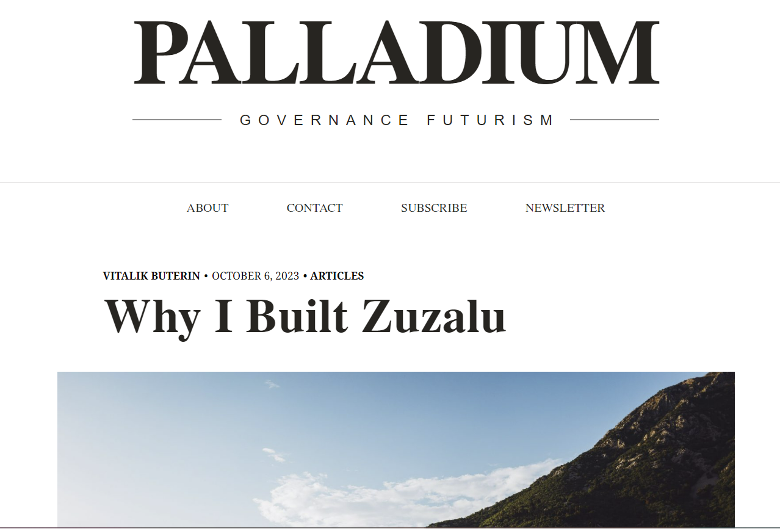
Prospera: A New Blueprint for Civilization
Posted February 05, 2024
Chris Campbell
“You can never change things by fighting the old system. Build new systems to make the old systems obsolete.”
I remember the first time I read this quote from Buckminster Fuller.
I was sixteen or seventeen.
Although it wasn’t so profound at the time…
I kept finding myself coming back to it.
Today, looking back, these nineteen simple words have informed my thinking more than anything else I’ve ever read, heard, or witnessed.
It’s allowed me to cut out 90% of the day-to-day noise.
Another quote, this time by William Gibson:
"The future is already here — it's just not very evenly distributed.”
Ten years ago, most people would interpret that as “First World” vs. “Third World”.
Ten years from now, I suspect that interpretation will be radically different.
I don’t claim to know what words we’ll use, but I suspect one thing will stand near the center of influence: startup cities.
To be sure, private cities have been on the minds and tongues of some of the world’s most innovative thinkers for at least a century.
BUT…
Finally, in the 2020s, we’re beginning to see the first real glints.
From where I’m sitting, it’s clear:
It’s an idea whose time is near…
And perhaps nearer than most think.
Prospera, Vitalia, Zuzalu, and YOU
For the next four weeks, I’ll be living with 200+ entrepreneurs, builders, lawyers, self-proclaimed geeks and widely-recognized visionaries in a small place called Prospera.
Prospera, if you don’t know, is a special economic zone (SEZ) and tech hub located on Roatán Island in Honduras.
It was established as part of Honduras' broader initiative to create Employment and Economic Development Zones (Zonas de Empleo y Desarrollo Económico, or ZEDEs).
Prospera operates under a unique legal and regulatory framework distinct from the rest of Honduras.
The framework is designed to be business-friendly, focusing on attracting brainpower and international investment by offering a stable, efficient, and transparent business environment.
Vitalia, on the other hand, is a pop-up city.
I’m here to see Prospera, but also experience Vitalia.
To use crypto terms…
If Prospera is a “Layer 1,” then Vitalia is a “Layer 2,” built on top.
Pop-up cities are considered to be the fastest onramp to get people interested in startup cities.
Last year, Vitalik Buterin, founder of Ethereum, organized the first crypto-native pop-up city called Zuzalu, held in Montenegro.
As Buterin points out in this article on why he built Zuzalu, “crypto has strangely resisted the gravitational pull of geographical centralization.”
Over 75% of crypto developers live outside of the United States. Contrast that with other exponential technologies, like AI, and the difference is stark.
Crypto isn’t just one of the most multidisciplinary industries, it’s also one of the most geographically diverse.
Zuzalu was one of the first times the crypto industry grounded its technologies into one central location for an extended period of time on a large scale.

Prospera, inspired by Zuzalu’s success, is running its own version: this time, with an emphasis on longevity, AI, and crypto.
From this, Prospera seeks to incubate ten new companies and bring in 20 new full-time residents.
By 2025-2026, Prospera aims for 1,000 residents and more then five Special Economic Zones.
In 10 years, the goal is to have 3-5 city locations, and more than 10 million residents.
Prospera might be ahead of the game, but they’re not the only ones ahead of this curve.
At the rate startup cities are cropping up -- even in the United States (more tomorrow) -- I wouldn’t be surprised to see hundreds, if not thousands, of startup cities around the world by 2030.
(Balaji Srinavasan said something to that effect in his speech yesterday.)
The Invisible Graveyard
One shining feature of these pop-up cities is their ability to speedrun innovation.
For example, biotech companies that are normally hampered by onerous regulations elsewhere.
Alex Tabarrok of George Mason University gave a speech yesterday on the “invisible graveyard” the FDA has created by holding back innovation in drug development and testing.
Here, they can operate under completely different -- and far more innovation-friendly -- rules.
Bryan Johnson was recently in the news for being “used as a human guinea pig” in Honduras.
Indeed, he came to Prospera. (In fact, he’s still here. I talked to him two hours ago.)

There is No Roadmap
Steve Jobs once said that if you care about software, you should build the hardware.
Vitalians say that if you care about technology, you should build your own governance wherever you possibly can.
Crypto has been working at this for over a decade in the virtual world. But now, we’re beginning to see these experiments touch grass.
This is the bleeding-edge.
There’s no “roadmap” to starting a new country in the world. (Singapore and other nation-states like it dropped hints.)
There’s also no easy way for individuals to switch governance providers. Startup cities are providing the framework.
Prospera is the most unique of the bunch so far: It has a level of autonomy no other startup city of its kind has achieved. Their autonomy means they effectively serve as small nation-states.
Startup cities are the future of governance. They will change our relationship with and perception of governance in ways difficult to predict.
Those who catch this trend early (and more importantly, act on it) will stand to reap the most benefits.
And not just in monetary terms. Startup cities allow us to rewrite the rules of how we live, work, and play.
Quality of work. Quality of life. Quality of education for your kids. Having the opportunity to live with like-minded people.
The old world is loud, angry, boisterous, and scary.
But you would be too if you were in its shoes.
Focus on the new.
